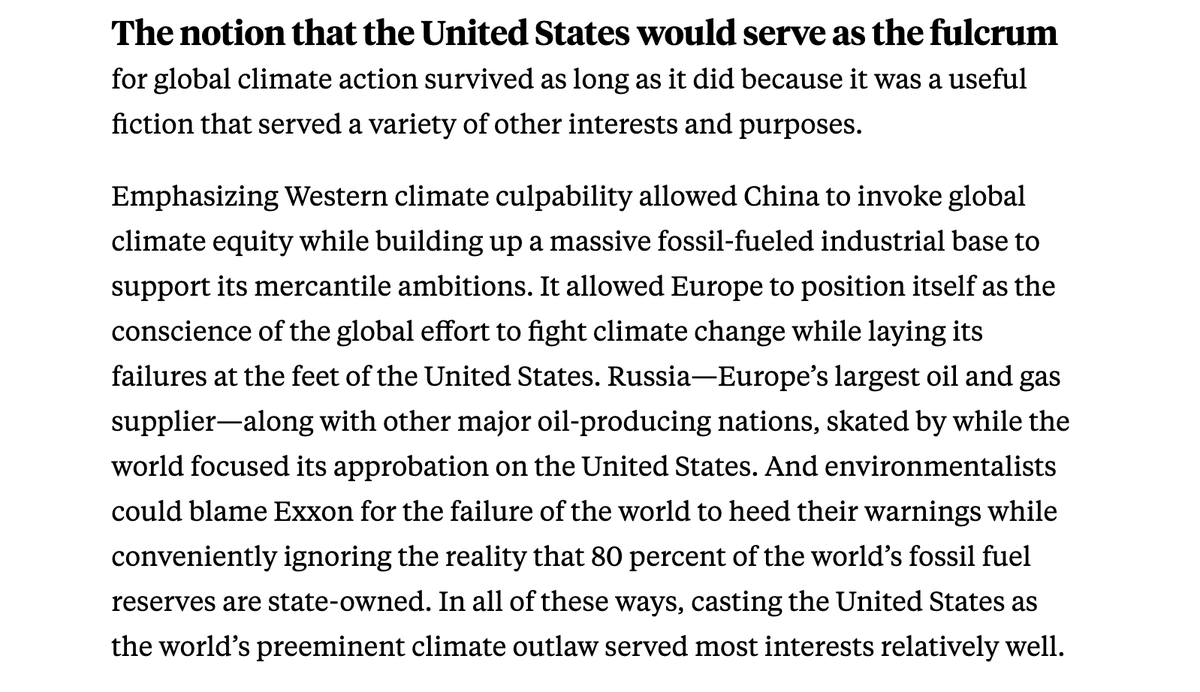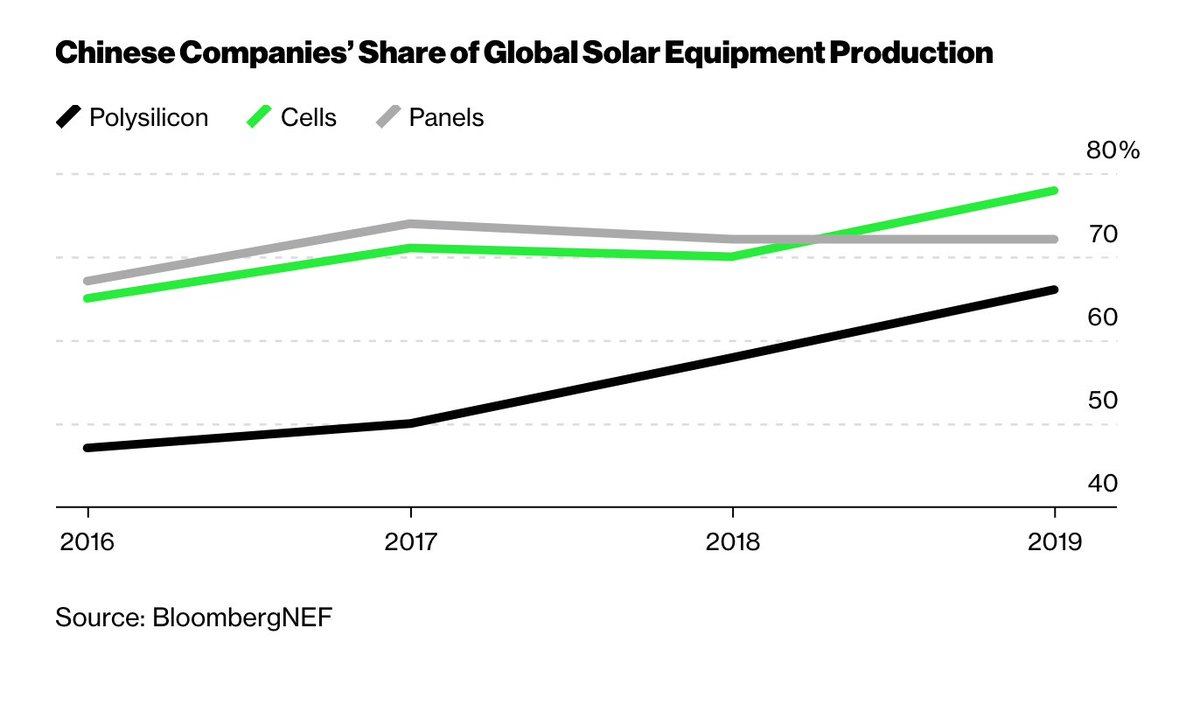A thread: China has challenged ideas of US climate ldrship with a new net-zero vow.
Why has China raised its ambition? Should we have forseen this? Have past climate efforts been hampered by assuming western ldrship? @TedNordhaus and I in @ForeignPolicy: https://foreignpolicy.com/?p=1030847
Why has China raised its ambition? Should we have forseen this? Have past climate efforts been hampered by assuming western ldrship? @TedNordhaus and I in @ForeignPolicy: https://foreignpolicy.com/?p=1030847
In part, China’s pledge was timed to capitalize on how US international credibility simply isn’t particularly strong at the moment.
(In the light of the world’s reaction to last week’s events in DC, this larger trend should be quite obvious.) (1) https://www.nytimes.com/2021/01/06/us/politics/trump-riot-dc-capitol-photos.html
(In the light of the world’s reaction to last week’s events in DC, this larger trend should be quite obvious.) (1) https://www.nytimes.com/2021/01/06/us/politics/trump-riot-dc-capitol-photos.html
We have to face the reality now that the big international breakthrough in climate commitments, rather than being US-led, has taken place in Asia, with Japan and Korea rapidly following China with new net-zero commitments. (2) https://twitter.com/Reuters/status/1320614642536861696?s=20
In this piece, we point out that perhaps we really should have forseen China's importance, and how the fact that int’l climate talks have long assumed the US to be the pivotal fulcrum of global climate progress may have actually hampered past progress. (3)
Part of this, yes, is due to stonewalling on the part of the US, with Congress for instance voting 95-0 in the summer of 1997 against the idea of making binding climate commitments unless China did as well. (4)
However, the state of the world today has largely vindicated the idea that meaningful global climate action could not proceed without major commitments from China. (5) https://twitter.com/wang_seaver/status/1341488974380953600?s=20
Even by the mid-to-late 1990s, the importance of China to future emissions and climate trajectories was becoming increasingly clear to all, posing intractable geopolitical obstacles to climate frameworks that seemed to overlook this reality. (6) https://twitter.com/wang_seaver/status/1346620170421211136?s=20
In practice, other int’l actors like the EU and Japan would, like the US, also moderate their climate commitments to protect economic self-interests as economic competition with China emerged as an increasing policy priority. (7) https://twitter.com/wang_seaver/status/1346219254656339969?s=20
In the meantime, American unwillingness to cooperate in climate talks also served China’s own purposes as well as a diverse range of actors’ economic interests around the world. (8)
So why did China break the gridlock? First, Beijing needed to meet other geopolitical needs. Second, China’s own industries, capacities, and resources were now in place to step up climate efforts without sacrificing economic growth. (9)
Xi Jinping likely wished to make the biggest possible contrast on climate with the Trump admin before Trump lost power, helping offset the hits to China’s int’l image due to events in Hong Kong, Xinjiang, the S. China Sea, and more. (10)
China’s pledge also preempted pending EU carbon border taxes.
But most importantly, top leaders had determined that China was simply ready, on an industrial scale, for the needed massive clean energy build-out to support a net-zero pledge. (11) https://www.carbonbrief.org/influential-academics-reveal-how-china-can-achieve-its-carbon-neutrality-goal
But most importantly, top leaders had determined that China was simply ready, on an industrial scale, for the needed massive clean energy build-out to support a net-zero pledge. (11) https://www.carbonbrief.org/influential-academics-reveal-how-china-can-achieve-its-carbon-neutrality-goal
Furthermore, by signaling this readiness through its pledge, China serves as a much more compelling climate leader for countries with similar challenges - high dependence on fossil fuels, ongoing urbanization and industrialization, major human development objectives. (12)
Indeed, a lesson here is that just as decisionmakers in 1997 should have given more thought towards patterns of global emissions and human activity in 2020, planners in 2020 should plan decarbonization of the world as it will look in 2050. (13)
Key decisions that will determine how quickly and deeply the world cuts emissions will be made in Beijing, New Delhi, Abuja, Jakarta, and Brasilia, not just Washington or Brussels. (14)
Oh, and Moscow. We don’t talk nearly enough about Moscow re: climate. (15)
As a poster child for rapid economic growth, as the world’s top manufacturer of solar modules, wind turbines + batteries, as an emerging tech leader, and with Xi Jinping’s word carrying weight, China is well-positioned for climate leadership. (16)
Meanwhile, given accumulated damage to the US’s reputation and the political constraints of narrow margins in Congress, incoming President Biden may find it very difficult to project a credible image of US leadership on climate. (17)
For now it might be more constructive for the US to work on climate at home rather than make speeches abroad, serving as a strong climate follower and also contributing to climate progress via innovative policies + technologies + dvlpmt support. (18)
Yet ultimately, a world where China leads on climate comes with significant implications. A world that succeeds in addressing climate change will not necessarily be a more equitable, inclusive, or humane one. (19) https://www.nytimes.com/2021/01/08/business/economy/china-solar-companies-forced-labor-xinjiang.html
The challenge will be to reconcile Beijing’s position as the major climate player with the continued need to stand strong on issues like Taiwan, Uighur oppression in a world where human rights + freedoms feel profoundly fragile. (20 - END)

 Read on Twitter
Read on Twitter



